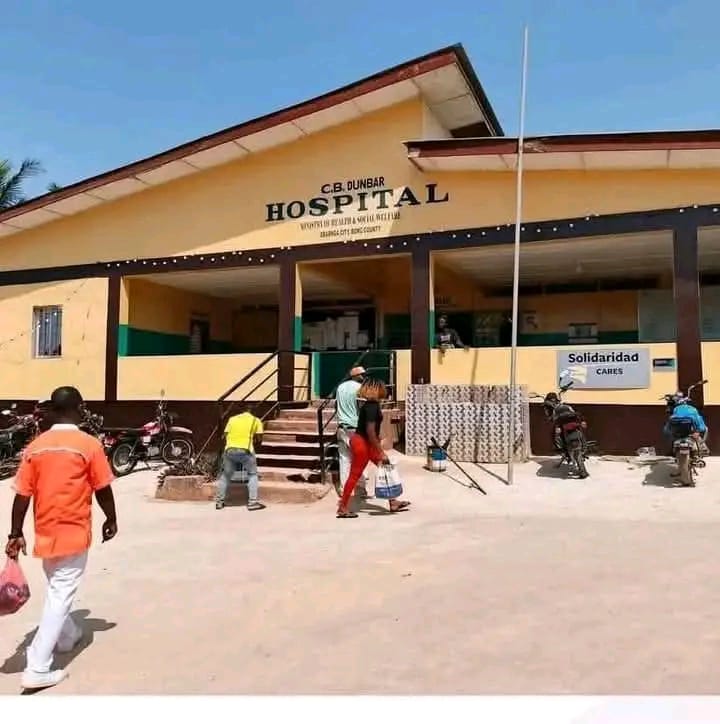The C.B. Dunbar Comprehensive Hospital in Gbarnga, Bong County, Liberia, the sole government-run healthcare facility in the region, finds itself embroiled in controversy following allegations of medical drug destruction. An independent investigation suggests that hospital officials incinerated a batch of donated medications received during the final year of former President George Weah’s tenure. The rationale behind this purported action, according to sources, stems from the belief that the donated drugs lacked efficacy in treating serious medical conditions. This incident has ignited concern among several medical professionals who insist that such a decision required prior consultation with the Ministry of Health, emphasizing the importance of established protocols for drug disposal.
The hospital administration, however, vehemently denies these accusations. Enoch Morris, the hospital administrator, refutes any claims of drug destruction, attributing the incident to a routine cleanup operation. Morris asserts that during this exercise, staff members were permitted to take home unused medical supplies deemed unsuitable for hospital use. He further explains that the burning involved only empty cartons that had housed these supplies, not the medications themselves. Emphasizing the importance of accurate information dissemination, Morris urges the public to verify information before propagating unverified reports. This clash of narratives underscores the need for a thorough and transparent investigation to ascertain the veracity of the claims and address the underlying issues within the hospital’s operations.
The allegations against C.B. Dunbar Comprehensive Hospital arise amidst ongoing efforts by the Liberian government to bolster the country’s vulnerable healthcare system. Such incidents potentially undermine public trust in healthcare institutions, highlighting the critical need for accountability and transparency within the sector. The accusations also raise pertinent questions about the hospital’s internal procedures, particularly regarding the handling and disposal of medical supplies. Given the hospital’s status as the only government-run facility in the region, its effective functioning is paramount to the well-being of the community it serves. The controversy underscores the significant challenges faced by Liberia’s healthcare system, which often grapples with limited resources and logistical complexities.
The alleged destruction of donated medications, if proven true, represents a significant loss, particularly in a resource-constrained environment where access to essential medicines remains a challenge. The implications extend beyond the immediate loss of the drugs, raising concerns about the decision-making processes within the hospital management. The reported belief that the donated medications were ineffective necessitates further investigation into the basis of this assessment. Without proper evaluation and documentation, discarding potentially usable medications could be seen as a mismanagement of resources, further hindering the already fragile healthcare system. The anonymous testimonies of concerned medical personnel add weight to these concerns, suggesting a potential disconnect between the hospital administration and its staff.
The hospital administrator’s explanation, focusing on a routine cleanup and disposal of unsuitable medical supplies, presents a starkly different picture. The distinction between unused supplies and actual medications is crucial in this context. The burning of empty cartons, while a common practice for waste disposal, does not address the core allegation of drug destruction. The administrator’s call for public verification of information highlights the importance of responsible reporting and the potential for misinformation to escalate tensions. However, it also underscores the need for the hospital administration to be proactive in providing clear and comprehensive information to address public concerns and maintain trust.
This incident at C.B. Dunbar Comprehensive Hospital underscores the broader challenges faced by Liberia’s healthcare system, including resource limitations, logistical hurdles, and the need for strengthened internal procedures. A thorough and impartial investigation is essential to determine the truth behind the allegations, address any shortcomings in the hospital’s operations, and ultimately strengthen public trust in the healthcare sector. The incident also serves as a reminder of the crucial role of independent journalism in holding institutions accountable and ensuring transparency in matters of public concern. The conflicting accounts highlight the importance of due process and the need to gather evidence from all involved parties to establish a clear understanding of the events that transpired. This incident should serve as a catalyst for a broader discussion on strengthening healthcare management and ensuring the efficient utilization of resources within Liberia’s healthcare system.


